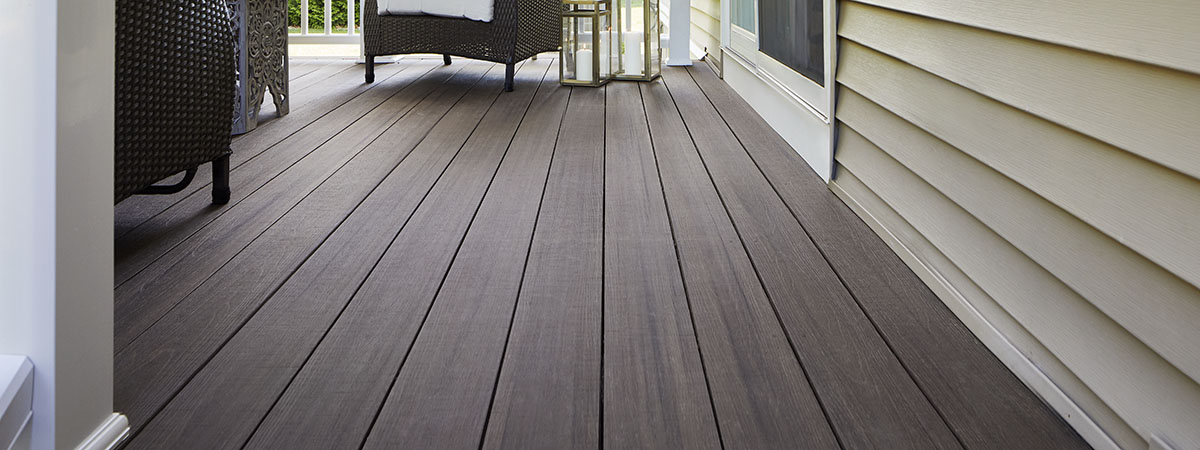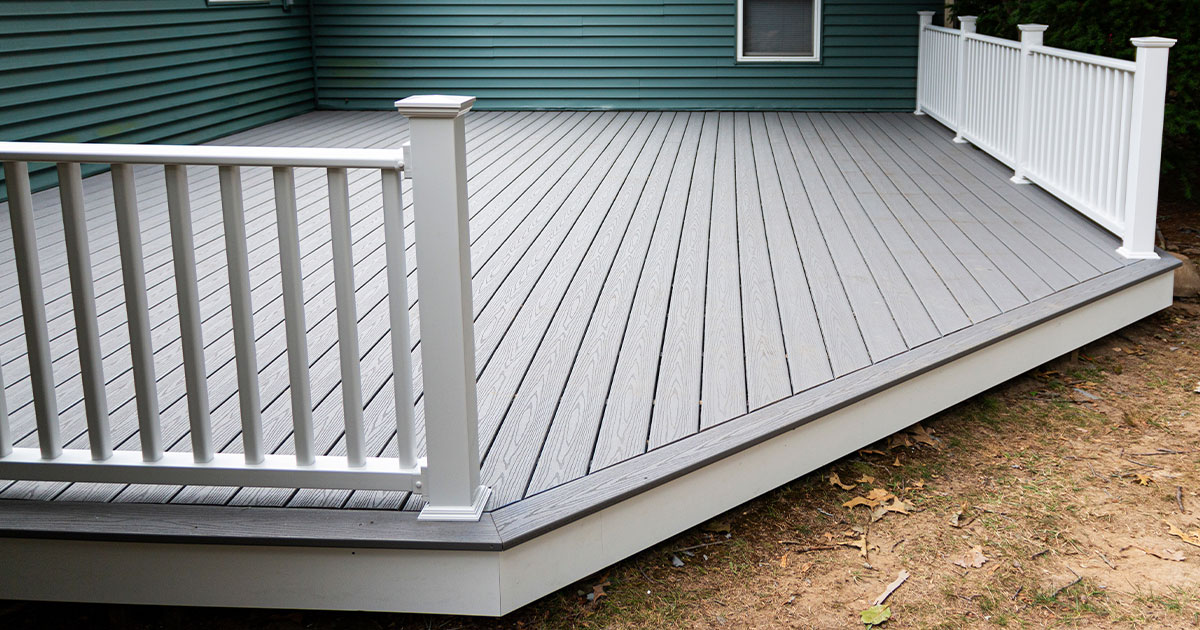Exactly how to Pick the Right Materials for Your Deck Setup Task
Selecting the appropriate materials for your deck installment project can seem overwhelming. There are various factors to think about, from durability and upkeep to aesthetic appeals and ecological impact. The option in between typical timber and composite products, each with its own set of advantages and drawbacks, can be specifically tough. The secret is to stabilize your budget, design preferences, and lifestyle needs to create a deck that will certainly boost your outside area for several years ahead.
Comprehending the Various Sorts Of Deck Products
When beginning on a deck installment task, the choice of materials comes to be a critical choice. Compound materials, on the other hand, are a blend of wood and plastic, giving sturdiness and resistance to weather components. By understanding these differences, house owners can make an extra informed decision on the most appropriate deck product for their specific demands.
Reviewing the Longevity and Upkeep Demands of Deck Products
Evaluating the toughness and maintenance requirements of deck materials is a crucial action in deck installment. Resilience entails the product's ability to stand up to rough weather, damage, and its long life. Cedar and redwood are normally immune to rot and pests, making them durable selections. On the various other hand, pressure-treated timber, while long lasting, may call for even more upkeep because of its sensitivity to cracking and contorting.
Recognizing upkeep demands is just as crucial. Some products need regular securing or discoloring to maintain their appearance and stand up to moisture damage, while others, like composite outdoor decking, require less maintenance. By evaluating these variables, one can pick one of the most appropriate decking product, ensuring an equilibrium between longevity, maintenance demands, and aesthetic charm.
Price Analysis: Comparing Timber and Composite Decking
Although price may at first feel like a second issue, it is a substantial element when comparing timber and composite decking. Timber, usually a cheaper choice, has a reduced in advance price. However, in time, upkeep costs can build up, possibly making timber a lot more pricey in the lengthy run. These maintenance prices might consist of discoloration, securing, or changing harmed boards. On the various other hand, composite outdoor decking, while costlier originally, calls for much less upkeep, possibly lowering long-lasting expenses. Yet, it's crucial to bear in mind that composite outdoor decking isn't unsusceptible put on and tear, and replacement prices can be high. As a result, potential deck owners have to consider their spending plan and readiness to maintain their decks when making a decision in between timber and composite outdoor decking.
Looks and Design Versatility of Decking Products
While expense is an essential factor to consider, the aesthetic allure and design versatility of outdoor decking products also play a substantial role in the decision-making process. Various products use varying levels of visual allure. Natural wood decking provides a traditional, ageless appearance, while composite products supply a vast variety of shades and appearances to match diverse preferences and designs. Likewise, design adaptability describes the ability to shape and manipulate the decking product to meet particular style demands. Timber, for example, uses high layout adaptability as a result of its convenience of reducing and shaping. Compound products, while much less versatile in design, are still adaptable sufficient for the majority of deck layouts. These factors, for that reason, are vital components in the option of outdoor decking material.
Ecological Effect of Decking Materials
When selecting decking materials, one must take into consideration not only looks and sturdiness, yet likewise the ecological effect. It is very important to examine the sustainability of materials and check out recycled outdoor decking choices. In addition, comprehending the potential influence on neighborhood ecosystems will certainly ensure a much more eco responsible option.
Analyzing Material Sustainability
In the world of deck construction, evaluating product sustainability is a crucial action. Composite decking products often incorporate wood and plastic, reducing the need for new lumber however enhancing dependence on fossil fuels - deck installation. Thus, the option of outdoor decking materials need to balance functionality, aesthetic appeals, cost, and sustainability to make sure a responsible and durable setup.
Recycled Outdoor Decking Choices

Compound decking is especially preferred as a result of its sturdiness and convenience of maintenance. It's resistant to rot, pests, and fading, making it a resilient option. Recycled plastic decking, on the various other hand, is very resilient and requires minimal upkeep. While these products might carry a greater preliminary expense, their long life and reduced ecological influence make them a smart financial investment for the eco-conscious homeowner.

Influence On Local Ecosystems
While the benefits of making use of recycled materials for outdoor decking can not be overstated, it's similarly vital to consider the wider ecological ramifications of these selections. The removal, processing, and transportation of materials can exceptionally affect local environments. Logging for timber decking contributes to habitat loss and environment adjustment. Also the manufacturing of composite products can launch hazardous exhausts. Conversely, using recycled or sustainably sourced materials can help reduce these effects. Additionally, thinking about the life expectancy of products can minimize environmental effect; longer-lasting choices call for less constant substitute, hence saving resources. Finally, proper disposal of old decking is vital to decreasing land fill waste (deck installation austin). Basically, an eco-conscious deck job demands mindful product option, sustainable sourcing, and liable disposal.
Making Your Decision: Tips for Choosing the Best Deck Products
As the article shifts right into the subtopic of "Making Your Last Decision: Tips for Choosing the Ideal Deck Materials", it is crucial to comprehend the variety of deck products offered. Striking an equilibrium in between longevity and looks is important in this selection procedure. The adhering to discussion will assist viewers in making an informed choice based on these crucial factors to consider.
Understanding Different Deck Materials
The job of choosing the appropriate materials for your deck installment can appear daunting due to the substantial variety of options available. Plastic or PVC decks are even extra resilient and call for less upkeep than composite products, but they next page can look much less natural. Light weight aluminum decks are solid, lightweight, and immune to rot, however they are also the most pricey option.
Sturdiness vs. Looks Balance
Stabilizing durability with looks address can be a difficulty when choosing deck materials - deck installation near me. High-traffic locations might require resilient materials like composite outdoor decking, which stands up to wear and tear but might do not have the all-natural beauty of wood. Property owners need to strike an equilibrium, thinking about both the deck's useful demands and their visual preferences.
Verdict
To conclude, picking the ideal materials for your deck setup job requires mindful factor to consider of aspects such as durability, maintenance, cost, looks, and ecological impact. Whether you choose traditional wood or composite products, your selection needs to align with your budget, design preferences, and way of living. Ultimately, the very best decking product is one that improves your outside area and offers pleasure for years to come.